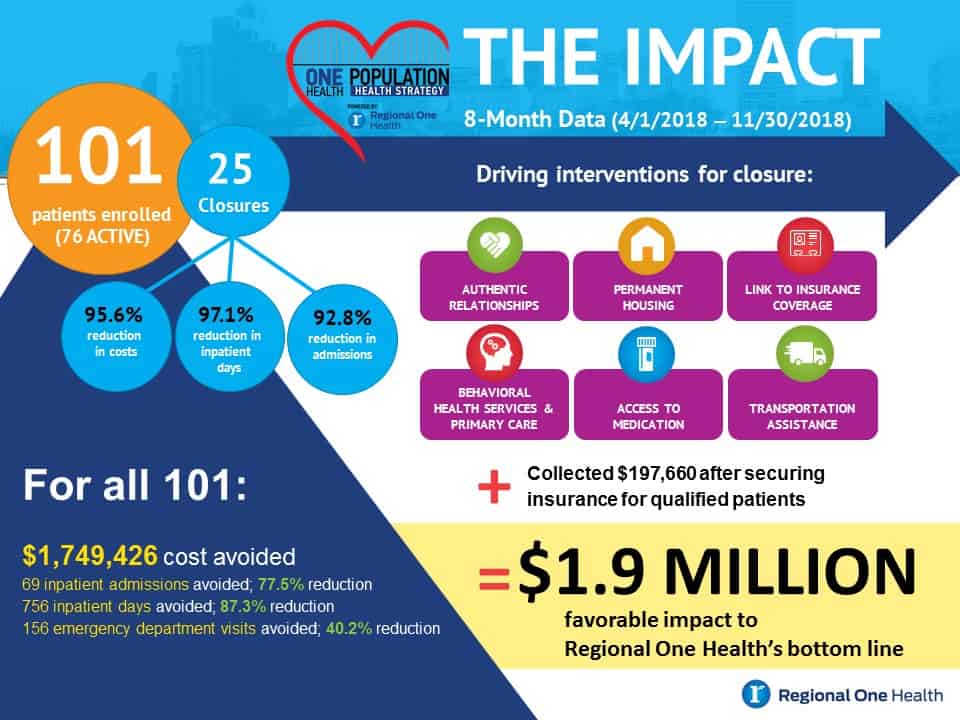Every Memphian deserves great health care.
It starts with ONE Health.

At Regional One Health, we understand that Memphis is a city with complex health issues. It’s our job to face them head on.
But what if the health care industry focused more on the word health in an effort to decrease the need for the word care?
Many are a health crisis away from losing everything.
Watch Alaenor’s story of hope and recovery | ONE Health
ONE Health: Explained
Why Trauma Informed Care Matters
The Purpose:
Within health care, there exists a patient population who utilizes high-cost services, like emergency department care, more than others. Often referred to as “high utilizers,” many of these patients lack social resources or find themselves with economic, education, addiction or housing issues that exacerbate their health. For example, a diabetic patient is told he needs to lose 100 pounds, but sodium-rich foods in bulk cost much less than healthy vegetables. Many populations in Memphis face health crises, but decisions are based on environment, many of which don’t allow for healthy choices.
It’s time for ONE Health in Memphis. Using compassionate care and exceptional services to keep our most vulnerable residents of the Mid-South healthier, ONE Health is a new concept in care that will transform the community.
The purpose of ONE Health is to reduce the human and financial costs among Regional One Health’s highest of high-utilizers. This proven model of care will improve patient outcomes and experiences within the health care system and lower unnecessary hospital use, reducing the cost of care.
Regional One Health has formed a partnership with the Camden Coalition to launch ONE Health. The Camden Coalition is a nationally-recognized nonprofit organization that works in its community to improve health and reduce costs. It uses data-driven, human-centered practices to improve patient outcomes and reduce the cost of care.
Together, Regional One Health and Camden Coalition will devote the next several months focused on analyzing every piece of data to better understand our patients and possible trends related to their circumstances that have them in need of care. Funded in part by the Assisi Foundation of Memphis, this project will give Regional One Health the resources to dig much deeper than ever before into underlying reasons people in our community become patients, and what we can do to reduce or remove those reasons.
“It must be done,” said Susan Cooper, RN, MSN, FAAN, the Chief Integration Officer at Regional One Health. “I think Regional One Health has the will. It certainly has the population that can benefit from these activities. This is a chance for us to take the learnings from others; the Camden Coalition nationally has set up a coordinating center for this complex care management. And across this nation they can choose to work with anybody, but they see something in us. They’re excited about coming here to Memphis.”
Read more about the background of the Camden Coalition and the basis for our program, here.
In its first eight months of enrolling patients, ONE Health, Regional One Health’s complex care initiative, has made remarkable strides among Memphis’s most vulnerable residents, giving hope to the hopeless and healing broken lives.
ONE Health, led by Regional One Health Senior Vice President and Chief Integration Officer Susan Cooper and Project Manager Megan Williams, has served 101 people since April 1 of this year. Seventy-six remain active and 25 people have graduated from the program.
For the 25 graduates, ONE Health has realized a decrease of 95.6 percent in costs, 97.1 percent decrease in inpatient days, and a 92.8 percent decrease in admissions.
For all 101 patients, ONE Health has resulted in avoiding $1.75 million in costs, along with 69 fewer inpatient admissions, 756 fewer inpatient days and 156 fewer emergency department visits. Combined with collecting $197,000 after securing insurance for qualified patients, the total benefit to Regional One Health’s bottom line was $1.95 million.
This is an excellent start to see the potential impact of the program.
Click here to read more about our progress.

“The changes we need to make seem pretty massive and monumental. But if I think about the change as a big ocean liner that has a rudder on the back, you can make a little change in the rudder and the ship will make a large change in direction in the ocean. We’re trying to find what are those little changes in the rudder of this ship called health care that can create these large changes in the health of the people we serve.” —Susan Cooper, Chief Integration Officer
Learn more about how ONE Health is changing health care in the Mid-South.
Sign up to receive updates on our progress.

